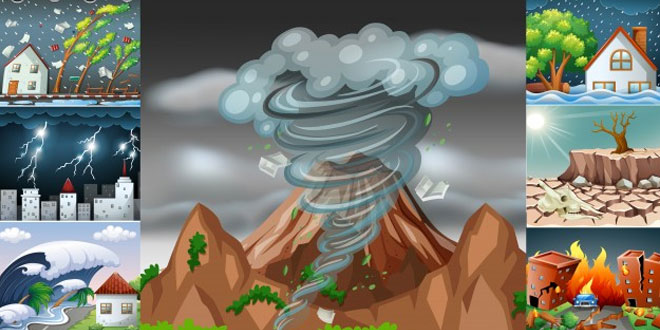Question: What is a disaster?
Answer: Disaster us a calamity often causing sudden, widespread and serious damage to life and property. Earthquakes, Tsunamis, Volcanic eruptions, Floods, Droughts, Cyclones, Landslides and Forest fires are forms of natural disasters.
Question: How does an earthquake occur?
Answer: Earthquakes are violent vibration or tremors on the surface of the earth. These tremors are both minor and major in intensity. Minor earthquakes happen everyday but we do not feel them. But major earthquakes are the most dangerous, widespread and destructive of all natural disasters. It is quite difficult to predict when an earthquake will occur.
Question: What are volcanoes? What are the different types of volcanoes? Give Examples.
Answer: Volcano is a vent or an opening in the earth’s crust through which hot molten magma from the interior (of the earth) comes out.
Different types of volcanoes:
- Active volcanoes: that have erupted recently and are likely to erupt again, for E.g. – The eruptions of Eyjafjallajokull in Iceland in 2010.
- Dormant volcanoes: are the ones which were active in the past but have remained quiet in recent times. They are also called ‘sleeping volcanoes’, for E.g. – Mauna Kea in Hawaii.
- Extinct volcanoes: are the ones which have not erupted in recent history. This may be because the supply of lava has been cut off, the plates have moved or their vent have been closed due to hardening of the lava. E.g. – Mt. Kilimanjaro in Africa.
Question: What is a flash flood? What are the precautions necessary in case of floods?
Answer: Flash floods: is a sudden flooding of water in low lying areas due to heavy rain or cloud break. It is sudden and extremely dangerous.
Precautions:
- People should be made aware via radio and TV for information and advice. In flood prone areas structures should be built to resist the forces of flood water. For instance, stilts are a good option for construction.
- People should plant more trees and deforestation must be controlled. Also, the drainge pattern in the cities must be effective.
- Use of all electrical items must be avoided.
- People should move to a higher ground and a good stock of food, water and medical supplies should be maintained.
- People should boil drinking water to avoid various diseases.
Question: How do we prepare for natural disasters like tsunami?
Answer: Tsunami is a Japanese term comprised of two words, ‘tsu’ meaning ‘harbour’ and ‘namis’ which means ‘waves’. They are a serious of waves which occur due to underwater volcanic eruption or earthquake. This displaces a massive amount of water in the ocean. It can occur anytime during day or night and is hence dangerous for the fishing communities, inhabitants of low lying coastal areas, etc. Tsunamis can travel upstream as well.
 Class Notes NCERT Solutions for CBSE Students
Class Notes NCERT Solutions for CBSE Students



